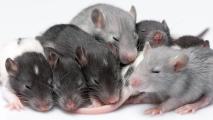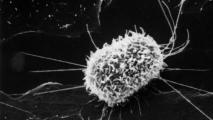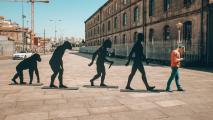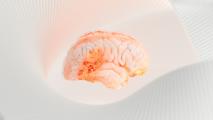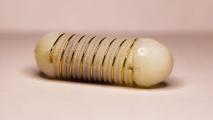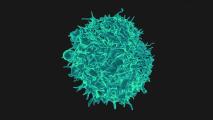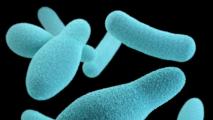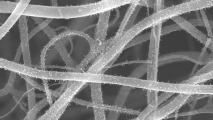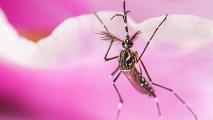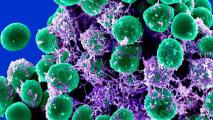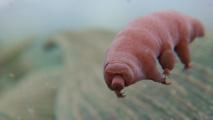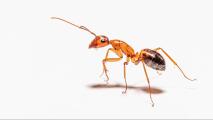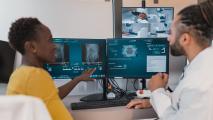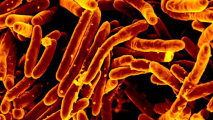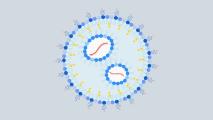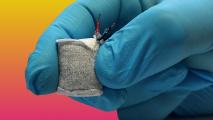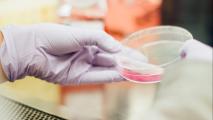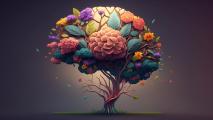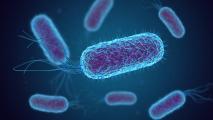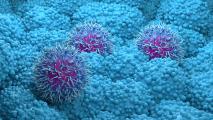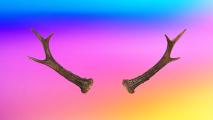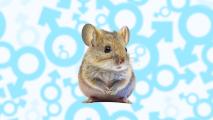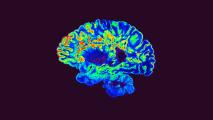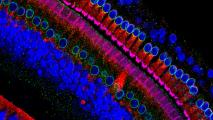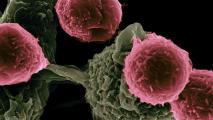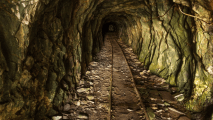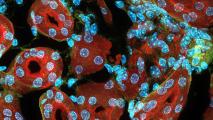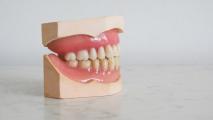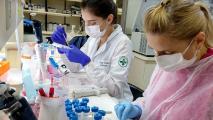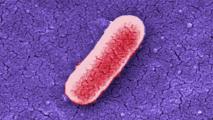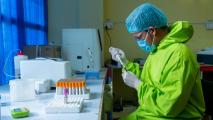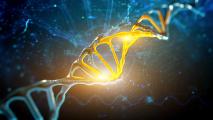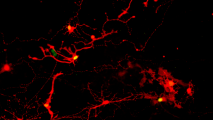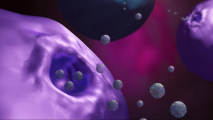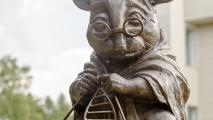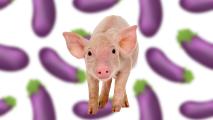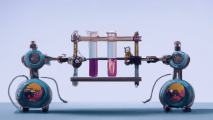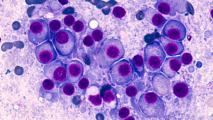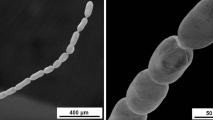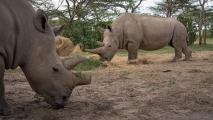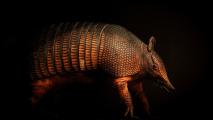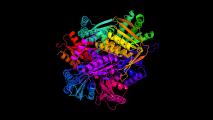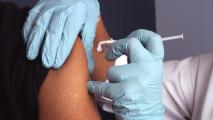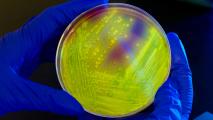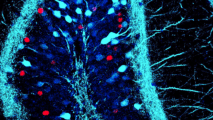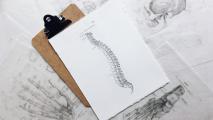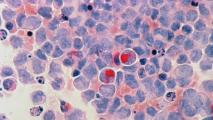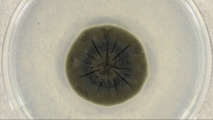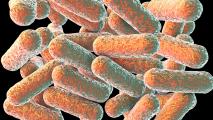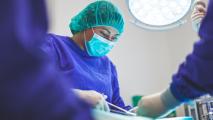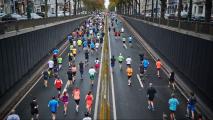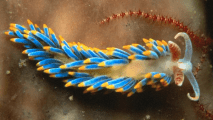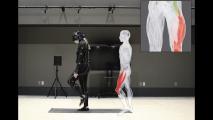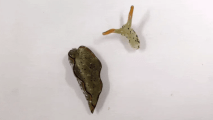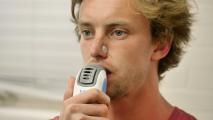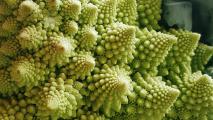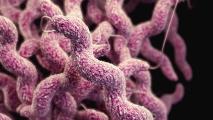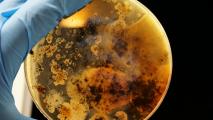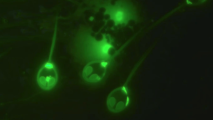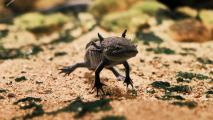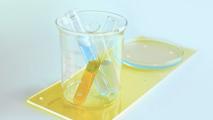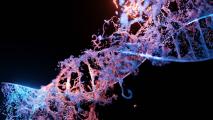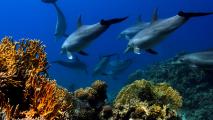Field: Biology
Scientists are growing animals in artificial wombs. Humans might be next.
Artificial wombs promise to give people a way to have biological children without putting their own health at risk.
The neurons that make us feel hangry
Researchers gave pinpointed a cluster of cells called AgRP neurons near the underside of the brain that may create “hangry” feelings.
Sound waves can trigger torpor-like state in mice and rats
Ultrasound stimulation triggers a torpor-like state in animals, suggesting a noninvasive way to put people into the state.
Gain-of-function research is more than just tweaking risky viruses
Gain-of-function experiments in the lab can help researchers get ahead of viruses naturally gaining the ability to infect people in the wild.
Chronic pain can be objectively measured using brain signals
Even though pain is universal and we know it happens in the brain, we've never before had a way to objectively measure its intensity.
Here’s how growing plants on the Moon could benefit Earth
Making plants grow on the Moon could be instrumental in helping gardens to grow greener on Earth in the face of climate change.
Did life evolve more than once? Researchers are closing in on an answer
Current scientific consensus is that life emerged from non-living molecules in a process called abiogenesis. But if life emerged once, why not more times?
Older people were 3x stronger at the end of this science-backed 8-week program
But what if you’re in your 60s, 70s, 80s or 90s? Is it “too late” to build muscle and fight sarcopenia? Here’s what the research says.
We’re analysing DNA from ancient and modern humans to create a “family tree of everyone”
Genetic genealogy not only helps us understand where we came from, but it could also be used for tracing the origin of genetic mutations.
Like hungry locusts, humans can easily be tricked into overeating
Our bodies crave more food if we haven’t had enough protein — especially if we’re reaching for ultraprocessed foods.
Discovery finally uncovers how melanin blocks UV
An international team of researchers have isolated and analyzed a component of melanin, which protects us from the sun.
Scientists discovered a “minimum mechanism” required for consciousness
Scientists stimulated the brains of macaque monkeys in an effort to determine which areas are responsible for driving consciousness.
New electronic pill zaps the stomach to regulate hunger
MIT’s new electronic pill stimulates stomach cells to regulate hunger — showing it's possible to hack the powerful gut-brain axis.
The groundbreaking plan to map the entire human immune system
Powered by AI and a vast trove of data, the Human Immunome Project aims to fully map the most complex system in the human body.
Potential way to treat anorexia found in microbiome
New research links the gut microbiome, an ecosystem of viruses, bacteria, and fungi, to the development of anorexia nervosa.
Networks of silver nanowires seem to learn and remember, much like our brains
Self-organising networks of tiny silver wires appear to learn and remember in much the same way as the thinking hardware in our heads.
A mosquito factory will create billions of biters in Brazil
The World Mosquito Project’s plan is to introduce bacteria-carrying mosquitoes to stop the spread of dengue.
Stanford researchers have engineered an organism to fight cancer
A team of Stanford and MIT researchers have engineered bacteria to create a topical tumor treatment and preventative effective in mice.
Scientists figure out why tardigrades are nearly indestructible
Tardigrades have been frozen, boiled, exposed to extreme doses of radiation, and remarkably still survive. How?
Scientists train ants to sniff out cancer in just 30 minutes
Ants were just as accurate as cancer-sniffing dogs. Better yet, they could be trained in minutes rather than months.
One way to speed up clinical trials: Skip right to the data with electronic medical records
It takes around 17 years for medical research to translate into clinical practice — why not use EMR data to speed things up?
Tuberculosis kills over a million people a year. New breakthroughs may help humanity fight back.
The world needs a tuberculosis vaccine, but the challenge trials that could help are impossible to run. Two new approaches look to change that.
New mRNA therapy could bring an end to peanut allergies
A new peanut allergy treatment based on mRNA could potentially lead to therapies that prevent all types of allergies in people.
Sugar-powered implant produces insulin as needed
A sugar-powered implant that produces insulin when blood glucose levels are high could make managing diabetes easier and less painful.
Saliva: The next frontier in cancer detection
Scientists are finding tumor signals in spit that could be key to developing diagnostic tests for various types of cancer
Have scientists found a “brake pedal” for aging?
A new protein discovery may have highlighted a "switch" in brain cells that slows down inflammation and aging.
Harvard geneticists create an organism that is immune to all viruses
Researchers at the Harvard lab of George Church have genetically engineered E. coli resistant to viral infection.
Spread of deadly cancer delayed by organ transplant drug
A groundbreaking discovery on how pancreatic cancer spreads could lead to better therapies for the hard-to-treat disease.
Mice grow mini deer antlers after stem cell transplant
The discovery of a new type of stem cell in deer antlers could lead to breakthroughs in human regeneration.
As bird flu spreads in the US and worldwide, what’s the risk that it could start a human pandemic?
Many virologists are concerned that the latest bird flu outbreak could spill over to humans and cause a new human pandemic.
First healthy mice with two dads — and no moms — born in Japan
For the first time, scientists have created healthy, fertile mouse pups using only the DNA of two adult males.
Here’s how your sleep affects your immune system
Researchers found that patients who slept less than six hours a night were 27% more likely to have an infection.
Oral bacteria trigger rheumatoid arthritis flare-ups
Periodontal (gum) disease is more common in individuals with rheumatoid arthritis, implicating the former in causing the latter.
New MS treatment targets the gut microbiome
We may be able to prevent chronic inflammation in multiple sclerosis patients by manipulating their gut microbiomes.
A new look at the strange case of the first gene-edited babies
Did He Jiankui "Make People Better"? A new documentary leans toward a different narrative about gene-editing than we've heard before.
New study discovers how to reverse hearing loss
A new study of hair cell regeneration in mice could help researchers figure out how to reverse hearing loss in people.
How diet influences the conflict between cell “cooperators” and “cheaters”
Cancer-protective microbes support cooperative behaviour by bodily cells, but cancer-inducing microbes undermine it.
Startup plants first GMO trees designed for carbon removal
Living Carbon is ready to begin planting thousands of GMO trees engineered to pull 27% more carbon from the air.
Strange life forms create an “alien” ecosystem in an abandoned uranium mine
Scientists have found diverse life forms dwelling in an abandoned, flooded uranium mine in Germany, creating an "alien" ecosystem.
Yoga: Modern research shows a variety of benefits to both body and mind from the ancient practice
Researchers have begun to study yoga's effects and are finding that it has great benefits for both mental and physical health.
Experiment regenerates a damaged kidney for the first time ever
A new treatment that caused the diseased kidneys of mice to regenerate might one day do the same for people.
New evidence that teeth can fill their own cavities
Researchers find that, in some cases, tooth dentin can be regrown instead of needing to be replaced with man-made composite.
“Bioprinted” skin could help end animal testing for cosmetics
Bioprinted skin can now look and act so much like real skin that it could one day replace some animal testing.
Human-rat brain hybrid shows a way to cure blindness
New research has shown that human “mini brains” can integrate with damaged rat brains to perform functions related to sight.
New “cyborg” cells could be the future of medicine
Semi-living “cyborg” cells might one day do everything from deliver cancer treatments to help clean up the environment.
Your microbiome is influenced by the people you hang out with
The human microbiome is largely influenced by our social interactions, according to the largest study to date of microbiome transmission.
mRNA could train our blood cells to stop chronic inflammation
A new study has identified the substance used by our white blood cells to reduce inflammation when it is no longer needed.
Jupiter’s hot “pizza moon” may contain life
Jupiter's moon Io is thought to be inhospitable, but new data suggests life could exist underground, perhaps in lava tubes.
New study finds 5-minute hack to balance sitting all day at work
Researchers set out to find the least amount of walking one could do to offset the harmful health effects of sitting.
5 biotech trends to watch in 2023
After a monumental year of breakthroughs, scientists, investors, and CEOs share which areas of biotech they are eagerly watching this year.
Study finds 155 tiny new genes evolving in humans
Microproteins encoded in short strands of DNA reveal our recent evolutionary history, and hint at how human genetics may be changing.
Lab-grown retinas move toward human trials
Lab-grown eye cells have demonstrated an ability to communicate, a huge milestone along the path to using them to reverse blindness.
Chickenpox and shingles virus lying dormant in your neurons can reactivate and increase your risk of stroke
People with shingles have an approximately 80% higher risk of stroke than those without the disease, and researchers want to know why.
A single injection of gene therapy made old mice live 7% longer
Biotech startup Rejuvenate Bio says it has extended the lives of elderly mice by 7% using a technique called “partial reprogramming.”
Artificial penis tissue restores erections in injured pigs
Artificial penis tissue that restored erections in injured pigs might one day do the same for people with erectile dysfunction.
New stem cell patches could repair babies’ heart defects permanently
Stem cell patches under development in the UK might allow surgeons to permanently repair infants congenital heart defects.
Not just light: Everything is a wave, including you
In the 1920s, the wave-particle duality of light was extended to include all material objects, from electrons to you.
This company turns food waste and mushrooms into building materials
UK-based company Biohm uses natural vegetative material like food waste and mushrooms to ‘grow’ insulation panels.
We gave ChatGPT a college-level microbiology quiz. It blew the quiz away.
A microbiologist devised a quiz that would be appropriate as a final exam for college-level microbiology students. ChatGPT blew it away.
New antibody therapy works for 73% of multiple myeloma patients
A new multiple myeloma therapy that uses an antibody to bring T cells to the cancer has shown efficacy in clinical trials.
Neuroscientists recommend more carbs and less coffee to combat seasonal depression
Taking small steps to help your circadian rhythm adjust to winter could mean happier times during what are literally the darkest days.
Mega bacteria that can be seen with naked eye shakes up the field of microbiology
A newly discovered species of bacteria is so large that it can be seen with the naked eye. It also contains a DNA-containing nucleus.
Just a few short bursts of physical activity each day might yield huge health benefits
Researchers tracked 25,241 non-exercisers wearing accelerometers to find out of brief bursts of activity lowered their risk of dying.
Stem cell breakthrough could save the northern white rhino
To save the northern white rhino species from extinction, researchers are turning stored rhino tissue samples into sperm and egg cells.
Armadillo experiment suggests that we can regenerate human livers with leprosy
M. leprae-infected armadillos develop enlarged, healthy livers with gene expression patterns similar to human fetal livers.
“DALL-E 2 of biology” designs proteins for new drugs
The Chroma AI's ability to design proteins with structures no one has ever seen before could revolutionize medicine.
Scientists uncover key to future hepatitis C vaccine
While treatments are available for HCV-related infections, they are expensive, hard to access, and do not protect against reinfection.
Startup unveils $179 houseplant engineered to purify your air
Neoplants' $179 genetically engineered houseplant pulls VOCs from the air 30 times more efficiently than plants found in nature.
Bacteria breakthrough could create brand new cheese flavors
A new set of experiments has shown for the first time how the unique flavors of different cheeses can be linked to specific types of bacteria.
FDA approves US’s first fecal transplant therapy
The FDA has approved Rebyota, a slurry used during fecal transplant therapy to treat recurrent C. difficile infections.
Newly discovered gut bacteria may be a culprit behind rheumatoid arthritis
This bacteria is found only in the intestines of people with rheumatoid arthritis, and not in the intestines of healthy people.
Exercise boosts the brain — and mental health
New research is revealing how physical activity can reduce and even ward off depression, anxiety and other psychological ailments.
How you breathe affects your brain
A psychiatrist and neuroscientists investigate how breathing affect the brain and biological markers of stress and immune function.
When is the best time to exercise?
Though morning workouts may be optimal for circadian rhythms, afternoon exercise tends to be slightly more efficient.
Good and bad memories are stored in different neurons, study finds
Positive and negative memories are stored in different parts of the brain, raising the possibility of therapeutic memory manipulation.
Injectable gel repairs severe spinal cord injuries and enables mice to walk
An injectable gel that prevents scar formation and stimulates regeneration successfully repaired severe spinal cord injuries in mice.
Brain implant translates neural activity into letters, letting a paralyzed man “speak”
A new device allowed a paralyzed patient to "speak," spelling out full sentences in real-time with an error rate of about 8%.
Doctors may not be ready for blood tests that screen for multiple cancers at once
MCED tests are different from existing ones because they are trying to detect early-stage cancer, when there aren’t that many tumor cells.
Chernobyl fungus could shield astronauts from cosmic radiation
A recent study tested how well the fungi species Cladosporium sphaerospermum blocked cosmic radiation aboard the International Space Station.
DNA-damaging molecules in the gut linked to colon cancer
A new Yale study linking a DNA-damaging molecule in the gut to colorectal cancer may give us a way to prevent the deadly disease.
Organ regeneration could overcome liver failure, without a transplant
Patients wait from 30 days to over five years to receive a liver transplant in the U.S. What if the liver could regenerate itself instead?
New exercise study could find drugs that mimic working out
MIT and Harvard researchers mapped out many of the cells, genes, and cellular pathways that are modified by exercise or high-fat diet.
These psychedelic “body snatchers” regenerate their bodies and absorb other organism’s attributes
These bizarre mollusks have the ability to regenerate their bodies and to absorb other organisms' attributes.
What you eat can reprogram your genes
You are what you eat, and what your parents ate, and what their parents ate. An expert explains how the foods you eat can reprogram your genes.
To avoid the worst effects of aging, we might need to exercise harder than we thought
To avoid one of the worst side effects of aging—bone, joint, and muscle pain—we might need to exercise a lot harder and more often.
New VR body suit lets you see inside your body while you exercise
A system for monitoring motion and muscle engagement could aid the elderly and athletes during physical rehabilitation.
Scientists discover slug that can decapitate itself, grow new body
Scientists observed two species of sea slug that were able to self-decapitate, survive for weeks without organs, and regenerate new bodies.
Five-minute breathing exercise can lower blood pressure
A simple breathing exercise called IMST can lower blood pressure as effectively as meds or aerobic exercise when done for five minutes a day.
Why does nature create patterns?
A physicist explains the molecular-level processes behind crystals, stripes, and basalt columns in nature.
Like genes, your gut microbes pass from one generation to the next
Not only did microbes diversify with their early modern human hosts as they traveled across the globe, they followed human evolution.
Genetically engineered bacteria make living materials for self-repairing walls and cleaning up pollution
With just an incubator and some broth, researchers can grow reusable filters made of bacteria to clean up pollution and more.
Study finds a striking difference between neurons of humans and other mammals
Researchers identified a “building plan” that holds true for every species they looked at — except for humans.
What’s causing the alarming rise in cancer for adults under 50?
A new review finds that 14 different cancers, including eight related to the digestive system, are increasing in people under age 50.
Scientists discover animal that doesn’t need oxygen to live
The parasite infects salmon and lives within the fish muscle, though scientists aren't quite sure how it breaks down nutrients for survival.
Axolotls can regenerate their brains
Axolotls are a model organism researchers use to study a variety of topics in biology because of their regenerative abilities.
Are near-death experiences just psychedelic trips?
One possible explanation of near death experiences is that our brains are flooded with a hallucinogenic, DMT.
When remains are found in a suitcase, forensics can learn a lot from the insects trapped within
The investigation of human remains in a suitcase can often represent a Pandora’s box, full of complicated problems.
ARPA-H: High-risk, high-reward health research is the mandate of new, billion-dollar US agency
A new multibillion-dollar federal agency was created with a goal of supporting “the next generation of moonshots for health.”
Woman with rare gene mutations feels no pain, anxiety
A woman in Scotland was found to feel virtually no pain and report zero trace of any anxiety or depression.
Dolphins use signature whistles to represent other dolphins – like names
Bottlenose dolphins are extremely social animals that communicate constantly, and consistently use signature whistles for one another.


